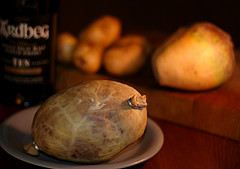6. Solved exercises
HAGGIS
While Paco
was in Edinburgh, he ate haggis. He didn’t like it very much but he’s open to
try typical dishes of the countries he is visiting. Paco has always been a bit
picky with food but he decided to open his mind when he left Spain.
Haggis is a
kind of sausage made of sheep’s liver, heart and lungs, mixed up with onion and
spices. Haggis’ origin probably comes from poor people wanting to use every
part of an animal for food but this is not very clear. Different people have
provided different theories regarding this aspect. Nowadays it’s the most
well-known traditional Scottish dish.
Haggis has
always been the main course of a Burns supper (25th January, when
the Scottish poet Robert Burns is commemorated), and whisky is the traditional
accompaniment.
For the last few decades, some shops have also created vegetarian haggis which has been surprisingly popular.
 |
| By Nick in exsilio, C. Commons |
Verdadero Falso
Verdadero Falso
Verdadero Falso
| INFINITIVE |
PAST SIMPLE |
P. PARTICIPLE |
SPANISH |
| like |
|||
| been |
|||
| made |
|||
| visit |
|||
| come |
|||
| ate | |||
| mixed |
|||
| want |
|||
| decided |
|||
| provided |
|||
| use | |||
| left |
|||
| commemorated |
|||
| created |
Of the regular verbs above, which ones would go in which column?
liked, visited, mixed, wanted, decided, provided, used, commemorated, created
| /t/ | /d/ |
/Id/ |
There are some words which directly indicate whether to use a Past Simple or a Present Perfect form. What tense is used when we find these words? (Some are from the text and some are not):
- Yesterday
- When he left Spain
- In 1990
- For the last few decades
- Last month
- Up to now
1. Paco (go) shopping yesterday.
2. Paul (live) in Cardiff for three years.
3. Paul (leave) Edinburgh three years ago.
4. Paco and Sonia always (get on) very well.
5. Paul's family (invite) Paco for dinner.
6. Paco (buy) a book last week.
7. Paco already (see) Edinburgh.
8. Paul's mother
(cook) a delicious dinner.